The ‘Coming out Celebration’ and the Chibite
We had breakfast at our hotel and travelled toward Bagamoyo. Bagamoyo means roughly “Lay down your heart” in Swahili. Two potential reasons. One is the role of the town in the Slave Trade. The alternative is simply that this is where the porters who were carrying massive loads to be shipped finally got to stop and rest. Near Bagamoyo is the village of Kimara Ngombe where we recorded Toroka Uje, a drum and dance band.
Toroka Uje
Toroka UjeWe arrived just as they were tuning their drums, by fire, and quickly interviewed a band member, Steven Jonas about drum names. Steven is also known as “Tomato”, a name given to him because he fits so well in any band he joins, like a tomato works with any sauce or salad. The drums were from smallest to largest:
- Chaavo Ndogo – small drum
- The Kinganga (Makonpe) or Kidalidali (Zaramo) – smaller drum
- Chapuo Kubwa – big drum.
- Boi – long drum, one sided
- Ndungula – big bass drum
- Nyanga – the shakers, made of empty tins filled with small pebbles.
Fire tuning is common across all of East Africa. Many traditional African drums are ‘untunable’, so you control tone through heat. You use moisture to loosen an over-tight drum or heat to evaporate moisture on a too-loose drum. Our sessions are typically filled with lots of smoke and video of drummers running back and forth in/out of camera range tuning their drums as they play. See example:
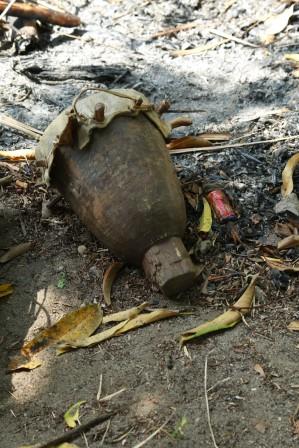
Here’s the Group:
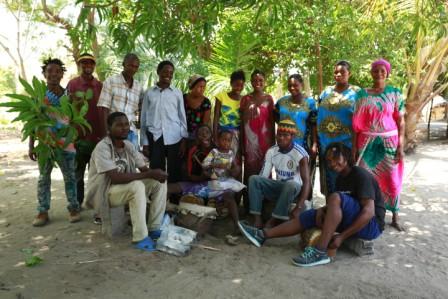
The group played 6 songs:
- Ndio Kwanza (We’re just starting and haven’t done anything yet)
- Mama Shughuli Yako Tomeiona (Now, you’ve seen how we play)
- Boga (Pumpkin), or Mboga in the local dialect
- Nina Ubembeleza Undugu (I’m begging for us to be brothers)
- Drum Instrumental
- Mama Ni Mama (A mother is a mother), a coming of age song
We interviewed Husein, the band leader, about the group and his memories of Mzee Morris.
“I was inspired by Mzee Morris who was one of my heroes from as long as I can remember. He always played with 10-12 drums and I couldn’t believe the sound he created. I started to play this style of drumming in 1982, starting with plastic jugs and then I formed my first group. I then followed the beat tradition of Vanga that came from my tribe. We rehearse twice a week and play in wedding and other ceremonies. We are also training young kids in our style but we are very worried that the traditional music is dying.”
Just as we were blown away by the Snake Dance in the Morris Compound, we were fascinated by Mama Ni Mama, a rite of passage song celebrating that a young girl is ready to be married. Briefly:
- The basic song, starts with an old women sitting down against a tree. Between her legs is a bundle covered by a blanket. The song first talks about the girl reaching the age where she needs to be hidden from men (roughly 15-17), protected in a hut, where she is instructed on how to be a wife, a mother and member of the village. In the dance, the ‘hidden girl’ is hidden under the blanket next to the woman. She is kept in the dark in a village hut from 6 months to 3-4 years depending on marriage prospects and her family’s ability to raise funds for the ‘coming out’ celebration. To symbolize her ‘emergence’, in the dance, the bundle is lifted onto a dancer’s back and carried into one of the huts in the village. At one point in the dance, she emerges from the hut without the blanket and she is lifted on to the shoulders of a male dancer and paraded through the village in celebration.
- The young woman who played the role of the girl in this rite of passage dance had, in fact, just gone through the ceremony 4 days before.
- Most of the lyrics in the song are about warnings, making sure the girl is wary of ‘the ways of men’ and also to prepare her to take on the new responsibilities of being an adult in the village, a wife, and a mother.
- The older woman, Ban Dami, has a specific role in this. She is there to comfort the girl throughout the ordeal and to give her lessons about how to live her life in the world of men. [Interestingly, during one of our drives through Tanzania, the BBC carried a February 24 2017 interview with Kenya’s Ida Odinga warning ‘sugar daddies’ off underage girls. The wife of former Kenyan Prime Minister Raila Odinga was telling men who pay young girls’ school fees in exchange for sex, to stay away. She attributed much of the rise of this phenomenon to the breakdown of village traditions and the fact that the women in the villages are no longer teaching young girls about the ‘ways of men.’ To be clear, she also blamed the men!]
- We talked to one of the female dancers, Zaituni Salum, about the reality behind the dance. She was kept in her hut for about 3 years as were most of the women dancers in her band. Essentially, from the moment she goes into the hut, the family is working to arrange a marriage and raise money for her coming out. We asked her about her experience: “You gradually get used to confinement and just accept it. There are lots of ladies around you, training you and preparing you for adulthood. They have all gone through it to, so it feels very normal, something you always knew would happen. But it is also very disorienting when you come out. First, there is the sun – you can barely open your eyes. [Note: In the dance, the young girl is given banana leaves to shield her eyes]. But also, the trees have grown since you’ve been outside and all seem different. Some neighbours have left the village, others have arrived. Children are bigger, parents are older. It is very confusing. But I am very glad I did it and I’m so sad these traditions are dying away. These rites really help keep the village together and is part of our civilization.”
- There is a similar rite of passage for the boys in the village, but they go to the bush. The dance and celebration is very similar to what we saw.
Here’s the beginning of the ‘hidden girl’:
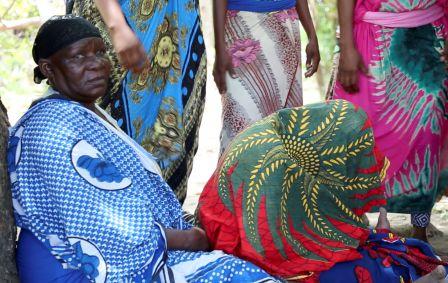
And here’s the end, with the girl’s eyes sheltered from the sun:
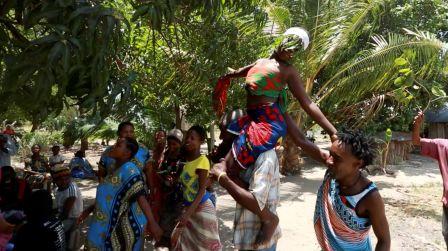
Chibite
We said our goodbyes and then moved on to the Boma Village, where we recorded Chibite, an amazing group of multi-instrumentalists. The group is a family group, with all members related to Msafiri Zawose, a very famous Tanzanian singer. He plays in the Gogo style of music which relies on the Zeze (stringed instruments made from gourds) and Ilimba (a lamellophone, or modified thumb piano). We will spend a lot of time with Chibite over the next two days and meet many different family members. For this first recording in Boma, the line-up was Ndahani Bwani, the older brother, his sister Ndekwa and two daughters Grace and Leah. Here’s the group:
The group is a family group, with all members related to Msafiri Zawose, a very famous Tanzanian singer. He plays in the Gogo style of music which relies on the Zeze (stringed instruments made from gourds) and Ilimba (a lamellophone, or modified thumb piano). We will spend a lot of time with Chibite over the next two days and meet many different family members. For this first recording in Boma, the line-up was Ndahani Bwani, the older brother, his sister Ndekwa and two daughters Grace and Leah. Here’s the group:
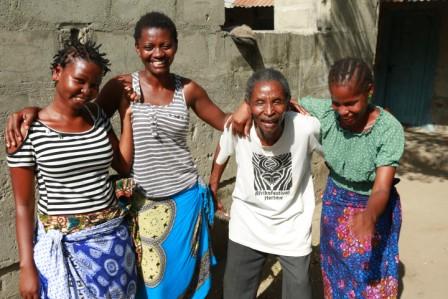
They played 5 songs:
- Dunia
- Nigahira
- Samamba: Streamlined.
- Malugaro:
- And a Magic Moment with Grace playing the Zeze (large stringed instrument).
Throughout, they played stringed instruments, thumb pianos and drums – all four could play each instrument and sing. The instruments were:
- Zeze: The stringed instrument made from a gourd, which comes in three sizes
- Ilimba: A lamellophone or modified thumb piano. The large one is call a Chilimba.
- Junga: shakers for ankles.
- Kayamba (Shakers)
- Chilemba (large) and Ilemba (small) thumb piano
From the Boma Village we travelled to our hotel, the Bagamoyo Country Club and recorded music with Henry Mkanyia, his son Leo Mkanyia, Rajab Alli Nyunyusa, Tomato (Steven Jonas) Sophie Grant, and Elliot Wenman. First, a bit of background on all the players here:
- Henry: Henry was born in 1950 and has played in multiple bands throughout his life. He plays guitar and vocals. Earlier, when he was a soldier, he played in the JKI Kimbuga Military Band, while stationed at the National Service Headquarters. His most famous band is the DDC Mlimani Park Orchestra, which was essentially a factory band. The DDC stands for the Dar es Salaam Development Corporation. They had multiple hits in the 80’s and 90’s including: Mpenzi Edita (name of a lady who portrays the lead singer) and MV Mapenzi (essentially the ‘love boat’). The latter is an East Africa classic that most people know. Throughout this trip, we will spent a lot of time with Henry, starting with this first night of live recording at the Bagamoyo Country Club.
- Leo: Leo is Henry’s son and has been our Influences Artist for this trip. He was raised in a musical household, but Henry did not want Leo to become a musician. In fact, it was Leo’s cousin Isaac Vledi, who first tried to teach an 8 year old Leo some of Henry’s riffs, because Henry refused. Isaac used to pull down Henry’s acoustic guitar from the rafters of his hut in their southern village Makua while he was travelling. It was only when Henry heard a 12 year old Leo play a song that he had learned on his own that Henry agreed to teach him. But even then, Henry only agreed to teach him if Leo promised not to pursue music professionally. It was Leo’s mom that finally intervened to support Leo’s musical ambitions, when Leo turned 20, noting that she had married a musician and loved a musician’s life. Leo calls his style “Swahili Blues” which was inspired mostly by his dad’s music, the music of Salim Abdalah (a great Tanzania guitarist) and his Mzee Morris’s drums. Ketebul Music first met Leo in Nairobi and helped produce his third album Bangili, which will be launched tomorrow night. Leo is very rooted in traditional Tanzanian music and his band features the Marimba (Tanzanian Xylophone) and a modified version Morris drums. He noted, “I want to play in the Morris style, but I can’t use his drums. They require fire for tuning and this isn’t practical as a gigging artist. So I have modified congas and bongos to replicate his drums. I’ve changed the skins to cow skins. When you combine these drums, the Mtoji, with the Kin’gan’ga (the two standalone drums that are part of the ‘Morris’ line up), you get pretty close to his sound.”
- Rajab Alli Morris is the grandson of Mzee Morris, whom we met on the first day. We wanted to bring him to the hotel and to introduce him to Leo’s modified drums to see if he felt they matched the sound of his grandfather’s drums. He loved them and agreed that such drums would help spread the influence of his grandfather as more musicians could use the drums, without fire tuning. We agreed that Singing Wells would fund the production of two sets, so they can be used by both Leo and Rajab’s groups.
- Sophie Grant and Elliot Wenman are both Abubilla Music Discovery artists and have also been Influences Artists on this trip (as well as helping with the normal recording and archiving functions of Singing Wells). They have just finished an album called Mirrors and are working on their second, called Hours. We will be travelling to Nairobi at the end of this Singing Wells trip to record fusion version of songs on their new album, Hours.
Sophie and Leo Rehearsing:

We recorded three songs:
- Kiingereza (English): This is Leo’s protest song against the policies of the Tanzanian government to require that all secondary students are taught in English. The result is awful for students, who go to primary school being taught in Swahili. They then arrive in secondary school to be taught advanced subjects in a brand new language they’ve never heard. And many fail out. In Kenya, the children are taught in English from day 1 of primary school. Leo’s song points out the absurdity of this and argues that the children aren’t dumb, but the policies are.
- Afrika: This is a beautiful song about the continent. The Singer asks, “Africa, why are you so dirty, so filthy, with broken roads and cities, with corrupt governments and failed states?” Africa answers, “It is not me, it is the humans that run the place. I give you beauty and riches but you turn it to filth and chaos.”
- Mirrors: This is a song from the Mirror’s Album, with Sophie on lead vocals and Elliot on guitar. We worked on a new ‘live version’ in the hotel as part of our Influences Sessions.
Why do we do these ‘fusion sessions?’ One mission of Singing Wells is to preserve the traditional music and dance of East Africa, before, sadly, some styles and instruments die. But another mission is to bring these traditions to new audiences, allowing new artists to work with traditional artists to bring new life to these sounds and movements. So, we want the grandson of Mzee Morris to work with current artists like Leo, Sophie and Elliot. We want Leo, Sophie and Elliot to be inspired by Rajab and Henry’s music and hopefully they will bring these styles to new audiences. This theme is critical to what we plan for tomorrow, which is a full day of hotel recordings.
